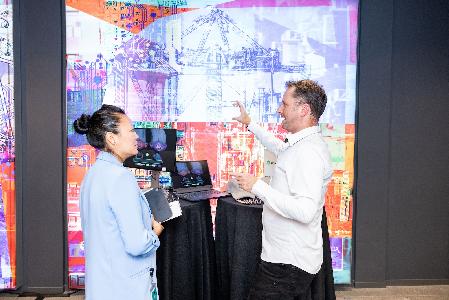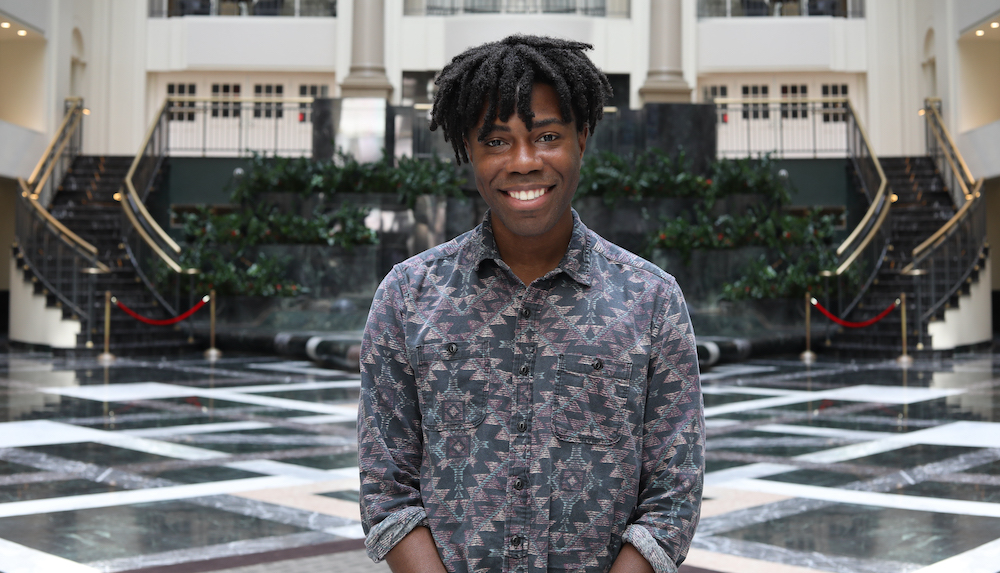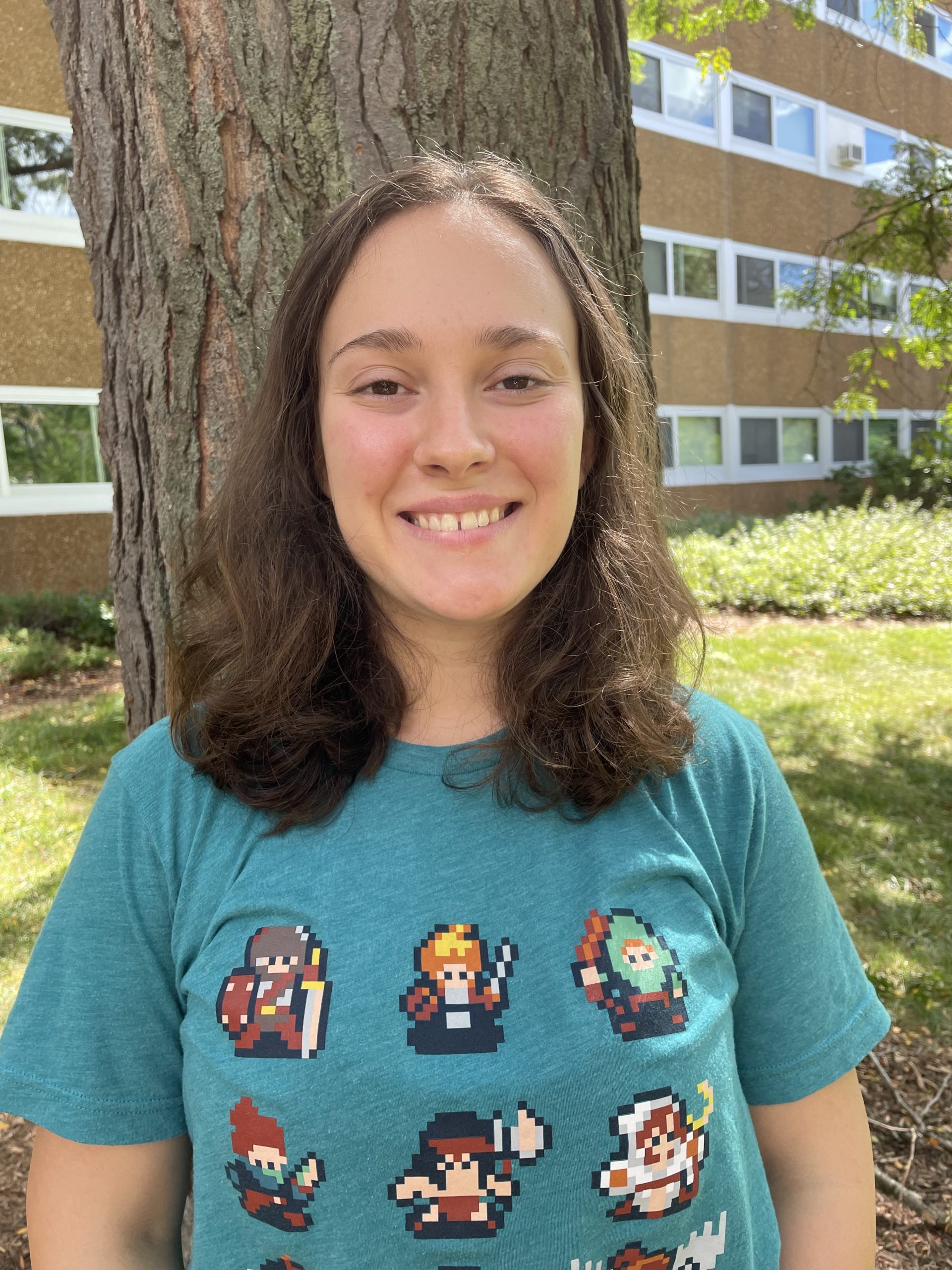Growing up in Baltimore, positive interactions with the tech community helped propel Christabella Palumbi’s career interests.
Palumbi is on her way to the University of Michigan and its school of engineering. As the 19-year-old looked back and reflects on her journey to college through Baltimore, it was her formative experiences at the Federal Hill-based Digital Harbor Foundation tech center and summer internships at Hunt Valley-based Big Huge Games with mentors like gaming entrepreneur Tim Train that set her on this trajectory.
“So many of the things I’m talking about come back to having affirming and confidence-boosting experiences with technology,” said Palumbi. “Tech is hard, coding is hard and it’s so easy to feel like you can’t do it or you’re not good enough. As a technology community — businesses, tech centers, makerspaces — we have an obligation to make sure people get affirming experience in technology because that is the only way they’re going to want to pursue a career in that field.”
Showing curiosity and plenty of ability, Palumbi has been working on tech side projects from an early age. Back in 2016, Technical.ly covered Palumbi while she was in middle school. She was already earning plaudits after learning skills in 3D printing at Digital Harbor and creating mobile games with Unity. And she picked up a nomination for a 2017 Baltimore Innovation Award along the way.
That coverage led to a connection with Train in 2018, and summer positions as an intern at Big Huge Games for two years. In turn, that led to an assistant engineer position at the company in 2020. In 2021, she followed many of her mentors like Aaron Barnett to streamer-focused game studio Captain.TV and worked as a software engineering intern there.
The positions gave her experience inside companies, which have provided many takeaways going forward.
“One thing it’s hard to realize from the outside is that these people who are software engineers are constantly learning and teaching themselves new things,” said Palumbi. “You’re not expected to know everything when you show up. Companies have all sorts of internal tools that you couldn’t possibly know before you show up.”
For those interested in entering such roles, Palumbi recommends being aware of tools like Github and approaches like version control, as well as familiarizing oneself with tech workflow norms like getting a copy of the codebase, making changes and requesting permission before putting those changes in the larger code.
We have an obligation to make sure people get affirming experience in technology because that is the only way they’re going to want to pursue a career in that field.
But, as an intern, there’s just as much to gain from interacting with people at a company. Palumbi stressed the importance of the soft skills, like communicating effectively with older, more experienced professionals and being unafraid to ask the questions needed to get the most out of the time at the company.
“I was so, so worried that I would ask a dumb question because I didn’t know what I was supposed to know. I didn’t want to be bothering people but [Tim Train] never acted like I was, because I wasn’t,” said Palumbi. That was how the entire Big Huge Games team made her feel. “They were always very happy to answer my questions.”
To those in internships and facilitating internships, Palumbi wants to emphasize that the point of an internship is to learn. In a perfect world, it should be an environment that encourages a mantra:
There are no stupid questions.
When it comes to comparing life in the workforce to school, Palumbi learned that there are always resources to bridge the gaps in knowledge, and no one expects perfection.
“In high school you have to memorize a lot of things and recite them on a test and that’s not what the workplace is like,” said Palumbi. “You always have Google or Stack Overflow and people use them all the time. You have your coworkers, too. You can always ask for help.”
Her experience with hackathons — including the student-run Harbor Hacks that she co-organized in 2017 — and Digital Harbor Foundation gave Palumbi the confidence to push past the self-doubt as a game development intern. Learning 3D printing let her know she had the capacity to learn React and use Node.js to build tools for a streamer hub app at Captain.TV.
Now, she’s taking the skills she learned to college. It’s highly likely (though not set in stone) that she’ll be a computer science major, but it’s undeniable that the time entrenched in tech from middle school to high school is fueling the passion she’s taking to a new phase.
“It’s really important for companies to get out of their comfort zones and give opportunities to young women and people that haven’t been told by society that tech is a place for them,” said Palumbi. “Companies really have an obligation to create these opportunities for high schoolers, not just college students, because by the time people arrive in college they already have an idea of what fields they are or are not interested in.”
Donte Kirby is a 2020-2022 corps member for Report for America, an initiative of The Groundtruth Project that pairs young journalists with local newsrooms. This position is supported by the Robert W. Deutsch Foundation.
This editorial article is a part of Youth Building the Future Month of Technical.ly's editorial calendar. This month’s theme is underwritten by Verizon 5G. This story was independently reported and not reviewed by Verizon before publication.
Before you go...
Please consider supporting Technical.ly to keep our independent journalism strong. Unlike most business-focused media outlets, we don’t have a paywall. Instead, we count on your personal and organizational support.
Join our growing Slack community
Join 5,000 tech professionals and entrepreneurs in our community Slack today!

This exec spent 30 years at one company, and thinks more people should do the same

AI in action: How InsightFinder AI and Robin AI transform IT and legal workflows at major organizations

Technical.ly’s new Report for America journalist in Baltimore will cover Maryland’s digital divide


